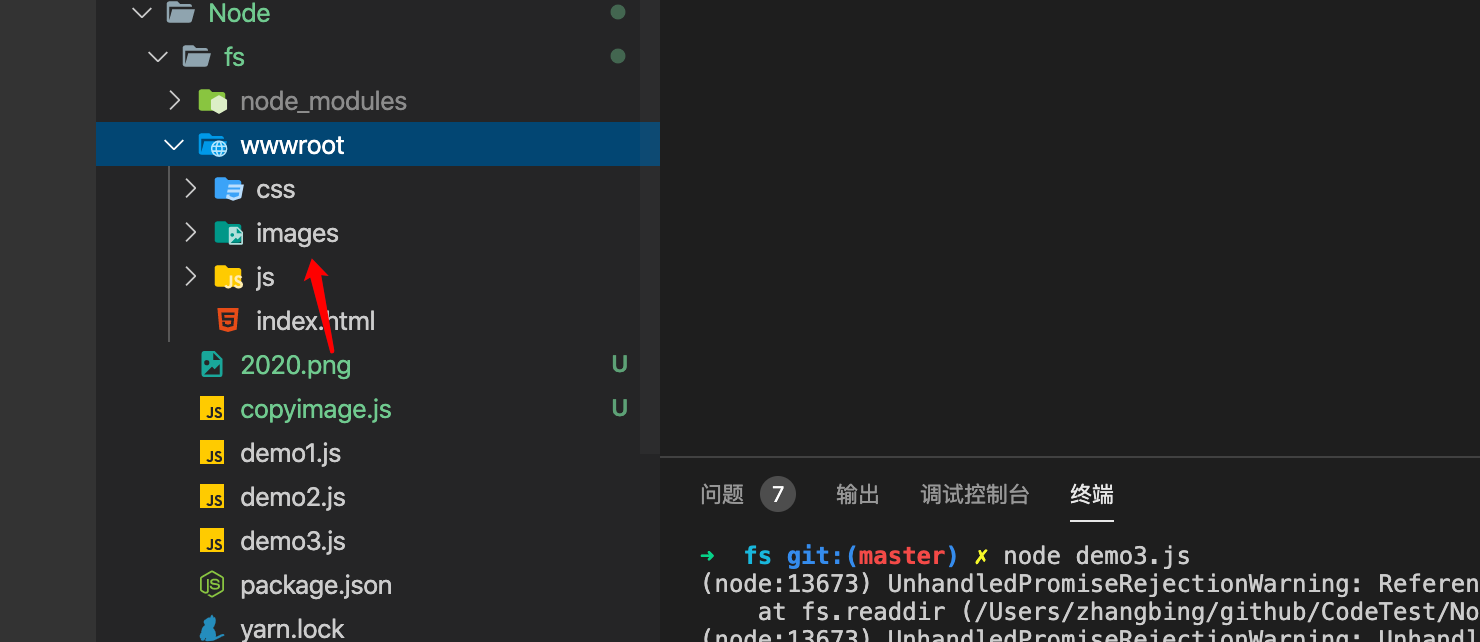
JavaScript does not have the ability to operate files, but node can do it. Node provides the operating file system module, which is a very important and high-frequency module used in node and an absolutely necessary module system.
fs module provides a lot of interfaces. Here we mainly talk about some commonly used interfaces.
1. Quick review of common API
fs.stat detects whether it is a file or a directory
const fs = require('fs') fs.stat('hello.js', (error,stats)=>{ if(error) { console.log(error) } else { console.log(stats) console.log(`Document:${stats.isFile()}`) console.log(`Catalog:${stats.isDirectory()}`) } })
fs.mkdir create directory
const fs = require('fs') fs.mkdir('logs', error => { if(error) { console.log(error) } else { console.log('Directory created successfully!') } })
fs.rmdir delete directory
const fs = require('fs') fs.rmdir('logs', error => { if(error) { console.log(error) } else { console.log('Directory deleted successfully logs') } })
fs.writeFile create write file
const fs = require('fs') fs.writeFile('logs/hello.log','Hello~\n', error => { if(error) { console.log(error) } else { console.log('File written successfully'); } })
fs.appendFile append file
const fs = require('fs') fs.appendFile('logs/hello.log','hello~\n', error => { if(error) { console.log(error) } else { console.log('File written successfully'); } })
fs.readFile read file
const fs = require('fs') fs.readFile('logs/hello.log','utf-8', (error, data) => { if(error) { console.log(error) } else { console.log(data); } })
fs.unlink delete file
const fs = require('fs') fs.unlink(`logs/${file}`, error => { if(error) { console.log(error) } else { console.log(`Successfully deleted file: ${file}`) } })
fs.readdir read directory
const fs = require('fs') fs.readdir('logs', (error, files) => { if(error) { console.log(error) } else { console.log(files); } })
fs.rename rename. You can also change the storage path of the file
const fs = require('fs') fs.rename('js/hello.log', 'js/greeting.log', error => { if(error) { console.log(error) } else { console.log('Rename successful') } })
2. Use of the third party NPM package mkdirp
mkdirp You can not only create folders, but also create multi-layer folders, similar to the mkdir-p command
midir -p tmp/foo/bar/baz
The above command can also create multiple folders in the current directory.
The following code generates a multi-level folder in the current directory
const mkdirp = require('mkdirp') mkdirp('tmp/foo/bar/baz').then(made => console.log(`Create directory at: ${made}`)) // Create directory in / Users/zhangbing/github/CodeTest/Node/fs/tmp
Result

3. Practical examples
Actual combat 1
Determine whether there is an upload directory on the server. If not, create this directory. If there is one, do not operate
const fs = require('fs') const path = './upload' fs.stat(path, (err, data) => { if(err) { // Execute create directory mkdir(path) return } if(data.isDirectory()) { console.log('upload Directory exists'); }else{ // Delete the file first, and then create the directory fs.unlink(path, err => { if(!err) { mkdir(path) } }) } }) function mkdir(dir) { fs.mkdir(dir, err => { if(err) { console.log(err); return } }) }
Actual combat 2
Under the wwwroot folder are images css js and index.html. Find all the directories under the wwwroot directory and put them in an array
Use synchronization method
const fs = require('fs') const path = './wwwroot' const dirArr = [] const dirs = fs.readdirSync(path) dirs.forEach(item => { if(fs.statSync(path + '/' + item).isDirectory()) { dirArr.push(item) } }) console.log('dirArr', dirArr) // dirArr [ 'css', 'images', 'js' ]
Using async/await mode
const fs = require('fs') const path = './wwwroot' const dirArr = [] function isDir(path) { return new Promise((resolve, reject) => { fs.stat(path, (error, stats) => { if(error) { console.log(error) reject(error) return } if(stats.isDirectory()) { resolve(true) } else { resolve(false) } }) }) } function main(){ fs.readdir(path, async (error, data) => { if(error) { console.log(error) return } else { for(let i = 0; i < data.length; i++) { if(await isDir(path + '/' + data[i])) { dirArr.push(data[i]) } } console.log('dirArr', dirArr) } }) } main() // dirArr [ 'css', 'images', 'js' ]
4. pipe flow
The pipeline provides a mechanism for output flow to input flow. Usually we are used to get data from one flow and pass it to another. In the following example, we read the contents of one file and write them to another file.
const fs = require("fs") //Create a readable stream const readerStream = fs.createReadStream('input.txt') //Create a writable stream const writerStream = fs.createWriteStream('output.txt') //Pipeline read / write operation //Read the contents of the input.txt file and write the contents to the output.txt file readerStream.pipe(writerStream) console.log("Program execution completed")
fs.createReadStream read data from file stream
const fs = require('fs') const fileReadStream = fs.fileReadStream('demo1.js') let count = 0 let str = '' fileReadStream.on('data', chunk => { console.log(`${++count}Received:${chunk.length}`) str += chunk }) fileReadStream.on('end', () => { console.log('---End---') console.log(count + ',' + star) }) fileReadStream.on('error', error => { console.log(error) })
fs.createWriteStream write file
const fs = require("fs") const data ='I got the data from the database. I want to save it' //Create a writable stream and write it to the file output.txt const writerStream = fs.createWriteStream('output.txt') //Write data using utf8 encoding writerStream.write(data,'UTF8') //Mark end of file writerStream.end() //Process flow event -- > finish event writerStream.on('finish', () => { /*finish-Triggered when all data has been written to the underlying system.*/ console.log("Write complete.") }) writerStream.on('error', err => { console.log(err.stack); }) console.log("Program execution completed")
Practice: copying pictures
There is a picture 2020.png in the root directory of the project, copy it to / wwwroot/images

The code is as follows
const fs = require("fs") const readStream = fs.createReadStream('./2020.png') const writeStream = fs.createWriteStream('./wwwroot/images/2021.png') readStream.pipe(writeStream)
It should be noted that the directory to be written by fs.createWriteStream must have the file name to be copied, that is, it cannot be written as fs.createWriteStream('./wwwroot/images /'), otherwise, the following error will be reported under Mac OS:
Error: EISDIR: illegal operation on a directory, open <directory>
Source code: https://github.com/dunizb/CodeTest/tree/master/Node/fs

